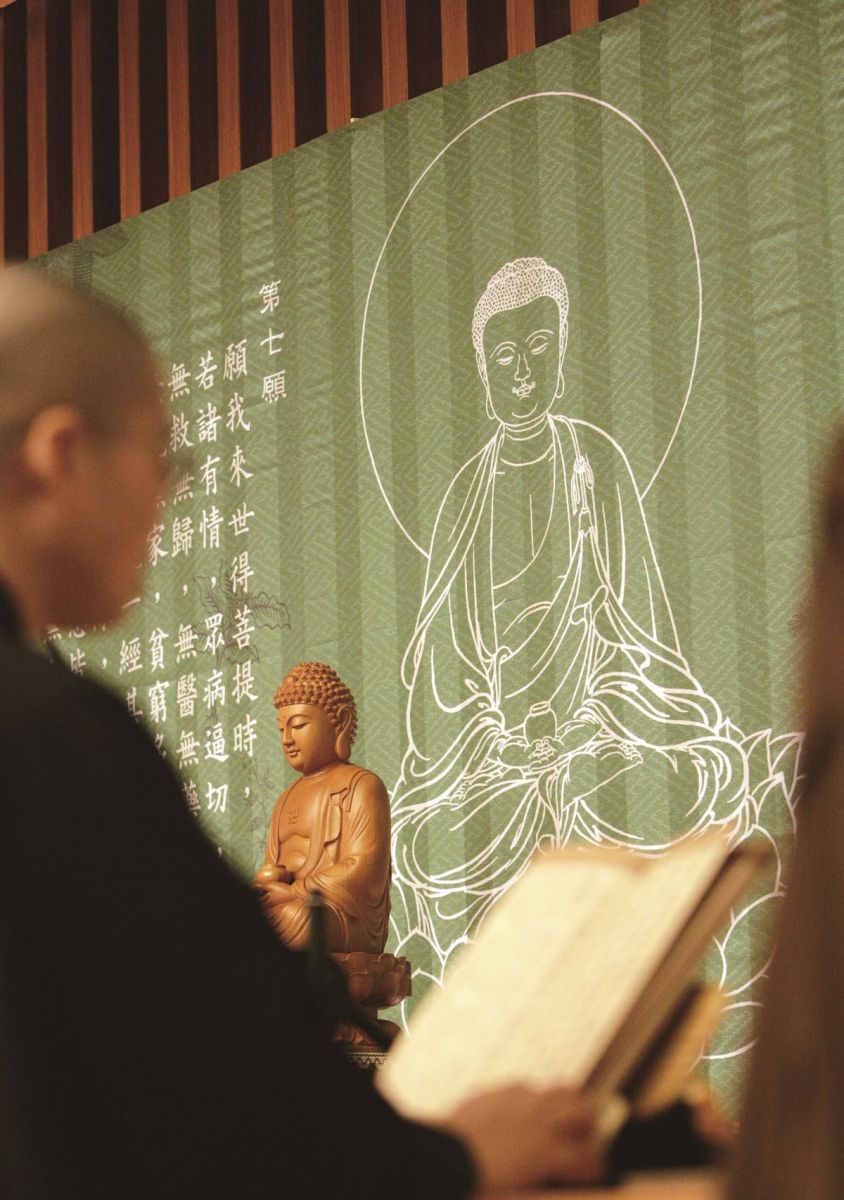Special Topics
Medicine Buddha’s Twelve Great Vows As an Example of Buddhism Practice
The Twelve Great Vows of the Medicine Buddha were compassionate aspirations the Buddha made in his causal stage of bodhisattva path practice. In witnessing and sympathizing with the afflictions suffered by sentient beings in this Saha world, the Buddha aspired to save and deliver them from the pain and distress of sickness, hardship, and misfortune. The general principles behind the Buddha's twelve vows are as follows: 1. All sentient beings attaining rebirth in the Eastern Pure Land of Azure Radiance (Vaidūryanirbhāsā) will be equal to the Buddha, endowed with the same 32 excellent marks.
1. All sentient beings attaining rebirth in the Eastern Pure Land of Azure Radiance (Vaidūryanirbhāsā) will be equal to the Buddha, endowed with the same 32 excellent marks.2. The Buddha's body radiates the glow of the Lapis Lazuli Light, awakening and enlightening those who dwell in abodes of darkness.
3. The Buddha's wisdom and expedient means enable all beings to be free of being deprived of necessary essentials.
4. Those who live an unwholesome way of life will be guided to change for the better, while Small-Vehicle practitioners turn to the Mahayana.
5. Enable all to be accomplished in their virtuous practice, while those whose discipline has slackened can defer back to virtuous behavior.
6. Sentient beings with any disability or physical imperfection will be reborn healthy, with complete physical faculties.
7. Those suffering ailments or diseases will regain bodily and mental wellbeing.
8. The Buddha helps women who are undergoing suffering and seeking for transformation into men to have their wishes granted, and eventually attain the ultimate Bodhi.
9. Those in the erroneous and non-Buddhist paths will be guided to have right views of the Dharma and engage in correct ways of practice.
10. Those who suffer unjust punishment will be freed of their worries and troubles.
11. Those suffering hunger will have sufficient food.
12. Those suffering from poverty and deprivation will have their whishes fulfilled.
Characteristics of the Twelve Great Aspirations
Looking at these twelve great aspirations in detail, it's not difficult to see that they mostly revolve around the physical and mental problems often faced by sentient beings. For example, the sixth and seventh aspirations both concern the suffering of sickness experienced by sentient beings. Furthermore, the third, eleventh and twelveth aspirations are meant to help poverty-stricken individuals by improving their standard of living. These aspirations have an encouraging and positive meaning that is significant to our modern lives.
The first aspiration marks equality for all people. The second is to help all beings enjoy an ideal livelihood of their choosing. This particularly demonstrates the Medicine Buddha's compassion in helping and saving all beings. The third is the Buddha's profound wisdom and infinite expedient means to help all beings enjoy abundant necessaries without any deficiency. The fourth stresses the importance of having the right view and correct knowledge regarding the practice of Dharma, and, ultimately, the Mahayana spirit of developing the bodhi mind for the benefit of self and others.
The fifth, sixth and seventh aspirations point out that through both the power of the Medicine Buddha's vows and through chanting the Buddha’s epithet, we are able to recover our Buddha-nature and improve our karmic capacity. As Ven. Guo Qian explained, from the perspective of Buddhist practice, this implies that Buddhists should engage more actively in emulating the Buddha by diligently practicing his methods. She said, "These three aspirations focus more on our own foundation, for when the foundation is correctly made, the direction of our practice will not go astray. How do we build a correct foundation? Buddhist sutras remind us to uphold the precepts, repent our past offenses with the utmost sincerity, and cultivate merit and wisdom as much as we can."
On the eighth vow of aspiring to have a male rebirth, Master Yinshun reinterpreted the literal meaning of female and male by stressing how we should develop our capacity of mind instead of getting distressed by our physical appearance. Furthermore, it was noted that we should practice the bodhisattava deeds as well as cultivate broad-mindedness. Both the eighth and the ninth vows actually focus on how we should make an effort to cultivate a virtuous mind.
In the book The Commentary on the Medicine Buddha Sutra, Master Yinshun concludes that the Medicine Buddha's twelve great aspirations are mostly meant to benefit people in their present life. "The first vow marks the truth that all beings are equal with the Buddha. This is followed by the right view, virtuous actions, basic enjoyment in life, improvement of defects, treatment of illnesses, and comfort to those in pain. It not only looks after the basic needs in sustaining our life, but also takes care of our education, health, and recreational activities, so that people can enjoy happiness and harmony". The master repeatedly stressed that the benefits of Buddhist practice are more than simply about attaining a better rebirth. By practicing according to the Twelve Great Vows of the Medicine Buddha, we can certainly benefit through the improvement of our present life.
Extended Reading:
Major Theme: Attaining Peace and Ease in the Present Life
Medicine Buddha's Twelve Great Vows As an Example of Buddhism Practice
How to Practice the Medicine Buddha's Dharma Method
Resource: Issue 331 of Life Magazine, Dharma Drum Publishing Corporation
Photos: Issue 331 of Life Magazine, Dharma Drum Publishing Corporation
Translation: Cheng-yu Chang (張振郁)
Editing: Chia-chen Chang (張家誠), Keith Brown
